- Home
- Beryl Kingston
Octavia Page 3
Octavia Read online
Page 3
‘Are we to go in now?’ Cyril asked.
‘I don’t think so,’ Octavia told him. ‘They said I was to stay out here with you.’
‘I don’t see why we have to stay here the whole time,’ Cyril said, kicking a flowerpot. ‘It’s not fair.’
‘Because we do,’ his sister told him firmly. She was very nearly eleven and a quarter now and two superior years older than Cyril, so she knew how a little brother should be treated. ‘They’re carrying the furniture in and they don’t want us under their feet. It’s no good getting ratty, Squirrel. You’ve just got to put up with it. They’ll let us in presently. Ma promised. Make room for Tavy. I tell you what, let’s play cat’s cradle.’
Cyril stood up and kicked the flowerpot into the middle of the lawn. ‘Pooh to cat’s cradle,’ he said. ‘That’s a baby game. I don’t want to sit on a rotten old seat all day, playing cat’s cradle. I want to see inside the house. What’s the good of bringing us here if they’re not going to let us in? I don’t see why I should spend my half term sitting in a rotten garden. I’m going to climb that tree.’
‘It’s not a rotten garden,’ Emmeline said, pulling the string into its first pattern ready to start the game. ‘It’s lovely. And mind you don’t fall. Your turn, Tavy.’
Octavia was just as eager to see the house as he was but she had greater patience, and besides, she knew she had to be good or Papa wouldn’t take her to see the Jubilee. So she settled herself onto the seat next to her cousin and lifted the string into its next pattern. ‘Fish in a dish!’ she said.
‘You’ve cut out two goes,’ Emmeline said, much impressed. ‘How did you do that?’ Then the baby dropped his rattle over the edge of the pram and began to cry for it so she had to stop to attend to him. ‘There it is, Podge! Don’t cry. There it is.’ But he went on crying even when the rattle was put in his hand and in the end she had to undo his reins and lift him out to comfort him. ‘Isn’t he a little duck?’ she said, bouncing him on her knee.
‘Quack, quack!’ Cyril mocked from the apple tree.
‘Don’t take any notice of your brother,’ Emmeline advised. ‘He’s just being ratty. I think you’re a darling and so does Tavy. When I grow up I’m going to have lots and lots of babies.’
‘When I grow up,’ Cyril said, in his most superior way, ‘I’m going to be a famous explorer and travel all over the world discovering things. I’ll bet they won’t say I can’t come into the house then.’
‘They won’t let you be an explorer if you don’t do as you’re told,’ his sister said scathingly.
‘That’s all you know!’ Cyril said, climbing higher. ‘You don’t have to do as you’re told if you’re an explorer. You just have to explore and find new countries and do daring deeds. You two can stay at home and have babies but I’m going to be important. So there.’
‘I’m going to be important too,’ Octavia said, stung by his scathing tone.
‘No you’re not.’
‘I am too. I’m going to change the world.’
He looked down on her from the twin heights of male superiority and the apple tree. ‘Girls can’t change the world,’ he said.
‘Why not?’
‘Because they’re girls. Boys change the world.’
‘What about the queen then?’
‘You can’t count her. Anyway, she hasn’t done anything. She’s not like an explorer or a general. She doesn’t do things. She’s just the queen.’
‘I think you’re horrid, Cyril.’
‘I hope you’re not quarrelling,’ Mama’s voice said behind them. ‘I thought we’d have our picnic out here. Come down out of that tree, Cyril, and help me set it out.’
So the quarrel was deferred in favour of ham sandwiches and potted shrimps and glasses of Mrs Wilkins’ lemonade. And after that they all went into the house and helped Mama to unpack Papa’s books and set his study to rights so that when he came home that evening he would find everything exactly as he’d left it in the old house that morning, except that in this house the study was on the top floor with a huge window overlooking the heath and in the old house it had been right by the front door and very dark. But they arranged the furniture in exactly the same positions so that he would know where everything was and even opened his journal at the right page and put fresh ink in the inkwell for him. And he was pleased. He said he would never have believed it and told Mama she was the best wife a man could possibly have, which pleased her and made her nose pink for the second time that day.
Aunt Maud and the cousins stayed to dinner that evening and Uncle Ralph arrived at six o’clock to join them, and although the meal was rather late because Mrs Wilkins couldn’t get the hang of the stove, it was very jolly. When it was over Papa said the house was warmed now and no mistake and thanked Aunt Maud for all she’d done to help them. And Aunt Maud said it was nothing and blushed and looked quite pretty. So what with eating and talking, there wasn’t time for Octavia to think about whether girls could change the world until Mama was tucking her up in her old bed in her new bedroom late that night.
‘What a day we’ve had, my Tavy,’ Papa said, as he stooped to kiss her. ‘So many changes.’
And that reminded her. ‘Papa,’ she said. ‘May I ask you something?’
‘Of course.’
‘Can girls change the world?’
He smiled at Mama. ‘They do it every day of their lives,’ he said.
‘No,’ she persisted. ‘I mean like Mr Morris. Really change the world.’
‘What makes you ask?’ Mama said.
‘It was something C—’ But then she stopped herself. Naming him might get him into trouble and she didn’t want that, ‘…someone said.’
Cyril, J-J thought, admiring her discretion. Now he realised that this was a serious question so he answered it seriously. ‘I see no reason why not,’ he said. ‘If Dr Pankhurst has his way women will soon be given the vote and then we shall see all manner of changes. The possibilities will be endless.’
Octavia didn’t really understand what he was talking about but she recognised a positive answer when she heard one. ‘Good,’ she said. And closed her eyes. ‘We are going to the Jubilee, aren’t we, Papa?’
‘Of course,’ he said, smoothing her hair.
‘I thought you didn’t approve of royalty,’ Amy teased.
‘I don’t,’ he told her, ‘but the child has earned a reward and it will be an education for her to see it. I shall buy the tickets tomorrow.’
Jubilee Day was a long time coming. Waiting for it got more difficult as the weeks went by even though there was plenty to keep them occupied in their new house. Something different happened nearly every day. A gardener was hired to tidy the flower beds and mow the lawn – and spent a lot of time grumbling because the last tenants had let it ‘run to rack and ruin’; there were three new servants to help Mr and Mrs Wilkins; decorators arrived to hang fresh wallpaper in all the downstairs rooms, which was nice because it turned out to be exactly the same paper as they’d had at the old house; and on Saturdays Emmeline and Squirrel came to visit and they all went out on the heath and spent the day exploring. It was gloriously hot so they had to be careful that Podge didn’t throw off his sunhat and get sunstroke, but he was pretty good and kept it on – more or less. Cyril fell out of a tree and wouldn’t let them see his bruises. And Emmeline arrived one Saturday to say that Uncle Ralph was going to let her go to the North London Collegiate School too and wouldn’t that be nice? But no matter how much they did and how far they walked, the Jubilee was still ages away. The papers were full of it, with pictures of the queen and her family and details of all the festivities that were planned for the great day. Papa said they were putting up a new grandstand near St Paul’s and that he’d bought three excellent seats for them. ‘You will have a bird’s eye view, I promise you.’ And Mama said if that was the case perhaps they ought to have new outfits for the occasion. What did Papa think?
So the outfits were ordered from the
dressmaker in Flask Walk and very pretty they were. Amy’s was a suit in lime green silk with ruched frills in the prettiest lilac set diagonally across the skirt and a lilac blouse that was all neat tucks with a white collar that covered her neck right up to her chin and rose in two curved wings on either side of her face. And Octavia had her first proper grown-up costume, in rose pink, finished with grass green bows at shoulder and wrist, which she wore with white silk stockings and white silk gloves and the dearest little straw hat trimmed with pink roses. And then, just when everything was ready, the weather changed and they had a violent thunderstorm. Octavia stood by the drawing room window, watching as the rain whipped the fruit trees and violet clouds massed and brooded over the rooftops.
‘What will happen if it rains on the day?’ she asked Mrs Wilkins. ‘Everyone will get wet.’
‘It won’t rain,’ Mrs Wilkins reassured her. ‘Don’t you worry your pretty head. We shall have royal weather. It’s always royal weather for the queen. God bless her. Now come away from the window, there’s a pet. We don’t want you struck with lightning.’
But the morning of the Jubilee was muggy and not at all promising.
‘You two must take your parasols and I will carry an umbrella,’ J-J decided practically. ‘Then we shall be prepared for every eventuality.’
So with every eventuality catered for, they set off for the City, travelling by horse bus because Papa said that was the best way. But when they got to King’s Cross the driver couldn’t take them any further because so many roads had been closed for the procession, so they had to get off and find some other way to proceed. Professor Smith took his family by the new underground, which Octavia found very exciting. She’d never travelled under the ground before and what with the smell of sulphur and hot oil and dust, the pressure of the crowds and the terrifying clicking of the train as it rushed in and out of the tunnels, she was quite breathless by the time they emerged into the air again.
They were in a wide street with very tall buildings on either side, all of them flying the Union Jack and hung about with so many garlands of green leaves that the air prickled with the scent of them and Octavia felt as though she was walking through a forest. The pavements swarmed with people, all very excited and all walking in the same direction. And the sun was shining.
‘Hold my arms,’ J-J said to his womenfolk. ‘I don’t want you getting lost.’ And off they went along the pavement with all the other people: men in boaters and blazers, smoking cheroots; men in bowlers and brown suits and stiff white collars, smoking cigarettes; women carrying baskets and umbrellas and folding chairs, as if they were off to a picnic; women in summer dresses and bonnets high with flowers and feathers and bright wax fruits; and hordes and hordes of children clutching tiny flags, all of them crushed in close together and all talking at once. ‘D’you ever see such a crowd?’ ‘Soon be there!’ ‘She’s got the weather for it, bless her.’ ‘Watch what you’re doing with that flag, Mildred. You go on like that, you’ll put the lady’s eye out.’ And after several jostling minutes, pushed up against other people’s bony arms and into the hot cloth on their backs, they emerged into a wide square in front of the biggest church that Octavia had ever seen and Papa said they’d arrived.
‘St Paul’s Cathedral,’ he told her. ‘One of the best examples of mathematical architecture in the world. Observe the grace of the columns, Octavia, and the balance of that architrave.’ But his daughter was gazing up at the great grey-blue dome shining in the sunshine above her and was lost in amazement at the scale and beauty of it.
‘You will see even better from our vantage point,’ her father said, leading her through the crowds again. ‘We go up these steps. Take care. They’re rather rickety. That’s the style. Second tier. Here we are. Now this is better.’
He was right. The view from their high grandstand was breathtaking, for now they could see the entire square in all its multicoloured detail, from the blur of the crowds on the pavements – all hats and faces and restless movement – to the stolid red backs of the guardsmen who lined the kerb, stiff as toy soldiers, their faces half hidden by great black bearskins. There was a statue on a plinth in the centre of the square, surrounded by iron railings, and the road that curved around it was empty, except for two cavalry officers on patient horseback. It looked very pretty because it had been sprinkled with pink sand. ‘To save the horses’ feet,’ Mama explained. But the most impressive sight was the great mass of people who were standing on the cathedral steps in such a blaze of scarlet and gold and white that they looked as though they had burst into flame. There were two huge choirs, one in long red robes and the other in white; dozens of clergy, draped and dramatic, all gold and white and embroidered; generals and admirals in full fig, medals, swords and all, their shoulders hung about with gold braid and their hats plumed with ostrich feathers. Several politicians strutted and looked important while their wives preened beside them, and on the bottom-most step, a line of Yeomen Warders from the Tower, quaint in their odd red and gold jackets. It looked like a huge stage set, painted and peopled and ready for performance.
‘Take a close look,’ J-J advised his daughter. ‘These are the people who run the country.’
‘They’re very grand,’ Octavia said. ‘Are they the great and the good?’
‘Not what you and I understand by the term,’ her father told her. ‘Although to be fair I suppose some of them might qualify. We must allow for idealism.’
There was a flurry of activity in the sanded roadway. Two more cavalry officers had arrived and were trotting up to their companions. There was a short conversation and then all four took up positions on either side of the steps, the crowd began to buzz and from somewhere in the western distance they could hear cheers rolling and rising. The parade had begun.
Octavia was enraptured. So many horses, all stepping in line, snorting and tossing their heads, and all the same colour; so many riders in magnificent uniforms: first a troop of guardsmen riding chestnuts, then another in splendid helmets and breastplates that flashed in the sun riding horses as black as silk. ‘Horse Guards,’ Mama explained. But Octavia didn’t care what they were; the sight of them was enough. She leant over the edge of the stand, agog for the next troop, as they rounded the street into the square, one after the other: Dragoon Guards, Hussars, Scots Greys, Cape Mounted Rifles, Trinidad Light Horse, Jamaica Artillery, Lancers of the Indian Empire, magnificent in striped turbans and formidable beards. Even their names were magical. And what colours they wore! Sky blue and gold, scarlet and gold, purple and gold, emerald green and gold. She had never seen anything so gorgeous. The sixteen carriages that brought up the rear of the procession were quite dull by comparison, although the ladies in them were beautifully gowned and held their elaborate parasols above their elaborately hatted heads as delicately as if they were holding flowers.
‘Are there any more soldiers?’ she asked her mother, leaning forward over the edge of the stand and straining to see. The crowd in Fleet Street were cheering like mad and there was a snowstorm of paper flags and white handkerchiefs, so something special must be coming.
It was a black coach with crimson wheels pulled by eight cream coloured horses, all caparisoned in crimson and gold, with postilions in crimson and gold walking importantly beside them, and sitting all on her own on the back seat, facing two rather grand ladies in lilac gowns, was a little fat lady in black, with a small black cap on her white hair, a white parasol above her head and a huge smile on her round face. The queen.
‘Sixty years,’ Amy said. ‘Think of that, Octavia.’
‘The richest woman in the world,’ J-J parried. ‘Think of that, Octavia.’
But Octavia was beyond thought, and cheering with the crowd. The noise they were making was so loud it was making her ears ring. ‘Isn’t it wonderful!’ she said.
The coach had come to a stop right in front of the steps and the archbishop was walking down towards it. ‘How will she get into the cathedral past all those people
?’ Octavia wondered.
But apparently she wasn’t even going to get out of the coach. The ceremony was going to be conducted there on the steps and they were going to see it all. The two choirs were already clearing their throats and settling themselves to be ready. What fun!
It was a very short ceremony, just the ‘Te Deum’, the ‘Old Hundredth’, a blessing, the ‘National Anthem’ and three cheers, but Octavia relished every minute of it. I’ve seen the queen, she thought, on her Diamond Jubilee. And cheered again as the lovely cream horses pulled the coach away, slowly and gently, round the statue and out of her sight.
‘What did you think of that?’ her mother asked.
‘I should like to see it all over again,’ Octavia said. ‘I feel quite sad now it’s over.’ And it was sad to see the way everything was breaking up after the event, the crowds shifting and beginning to walk away, the serried ranks of choirs and dignitaries turning and moving, breaking their wonderful patterns, the pink sand littered with discarded paper flags and smeared with trodden manure. ‘But it was wonderful, wasn’t it, Mama? When I grow up I’m going to be rich and famous and ride in a carriage too.’
They were negotiating the steps from the grandstand. ‘Well, if that’s the case, miss,’ her mother teased, ‘you will have to find yourself a rich husband.’
Octavia grimaced with distaste at such a suggestion. ‘Oh no, Mama,’ she said seriously. ‘That would be cheating. I mean to be famous in my own right because of something I’ve done.’
Amy smiled. ‘And what will that be, pray?’
‘I don’t know yet,’ Octavia admitted. ‘Something good and helpful.’
‘You still intend to change the world then?’ her father said, handing her down the last rickety step and onto the pavement again.
‘Yes, Papa,’ she said. ‘Of course.’
But her father was looking at Mama and offering his hand to help her down the step and the topic seemed to be over.

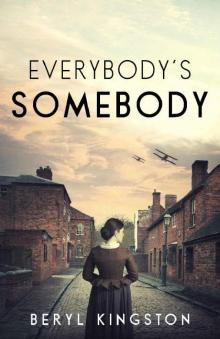 Everybody's Somebody
Everybody's Somebody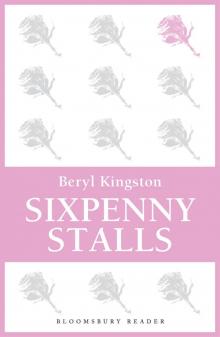 Sixpenny Stalls
Sixpenny Stalls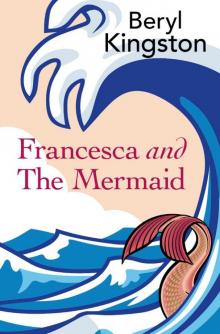 Francesca and the Mermaid
Francesca and the Mermaid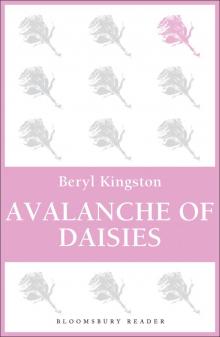 Avalanche of Daisies
Avalanche of Daisies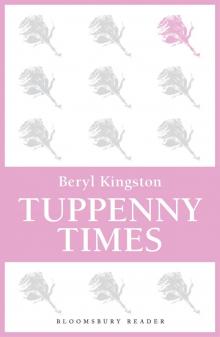 Tuppenny Times
Tuppenny Times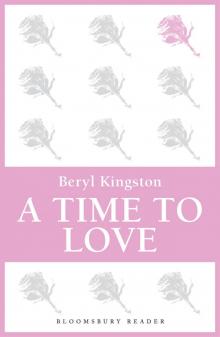 A Time to Love
A Time to Love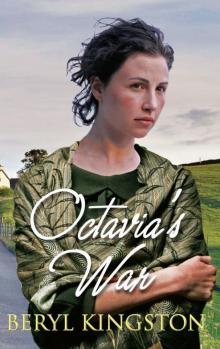 Octavia's War
Octavia's War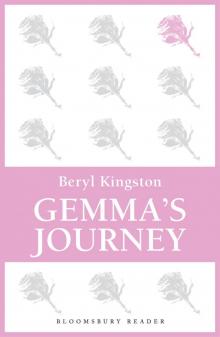 Gemma's Journey
Gemma's Journey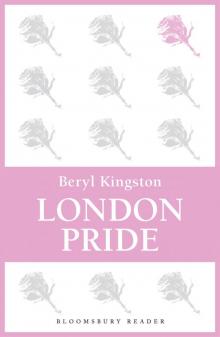 London Pride
London Pride Gates of Paradise
Gates of Paradise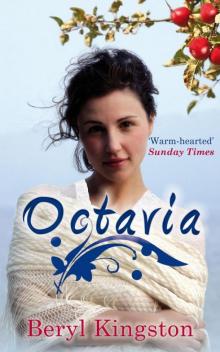 Octavia
Octavia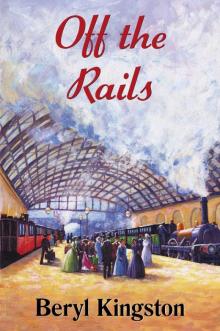 Off the Rails
Off the Rails Maggie's Boy
Maggie's Boy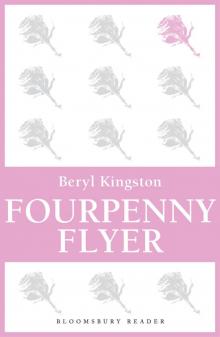 Fourpenny Flyer
Fourpenny Flyer